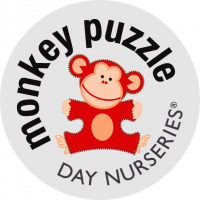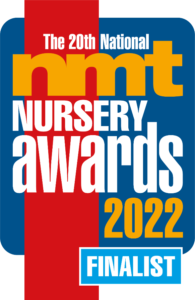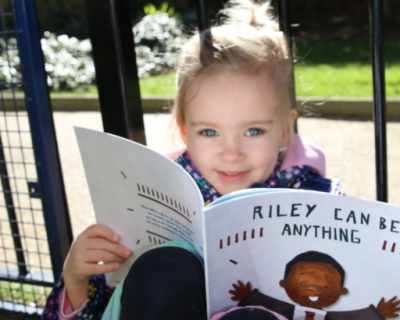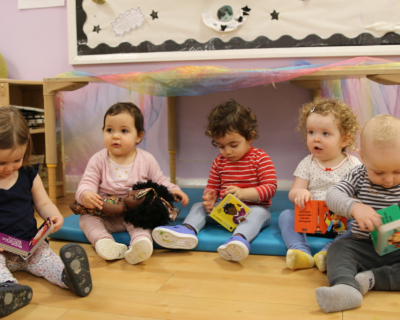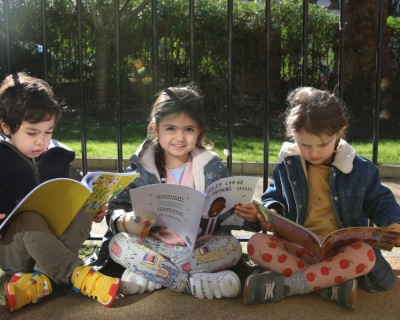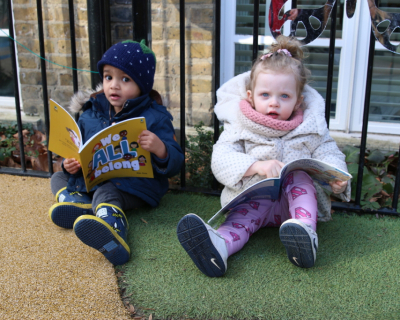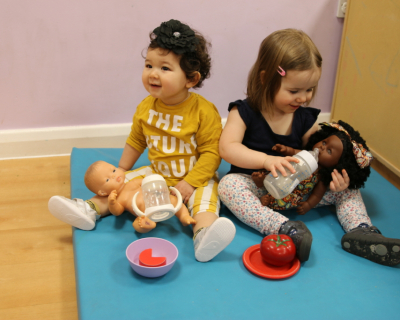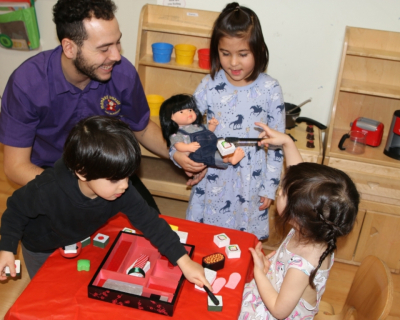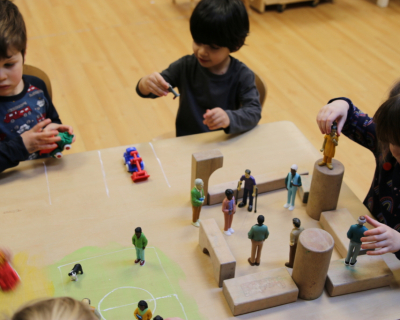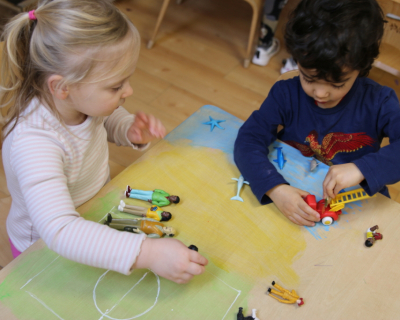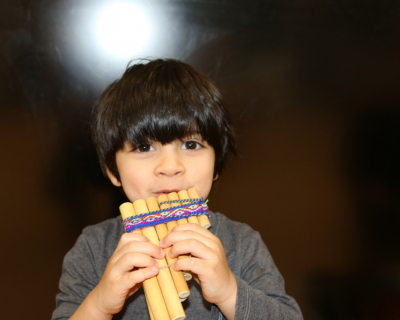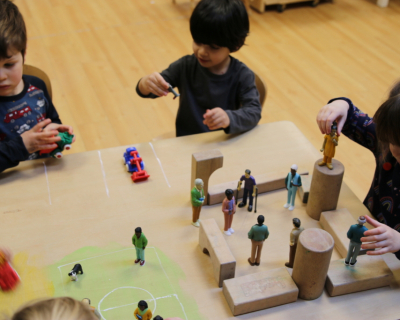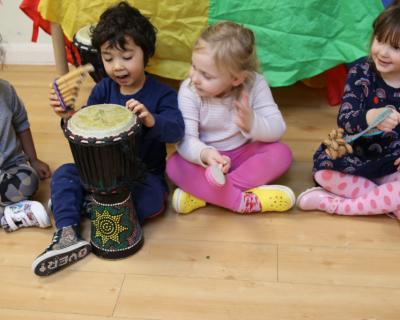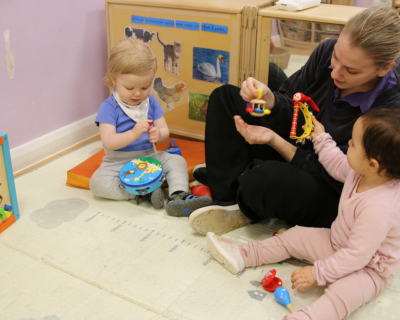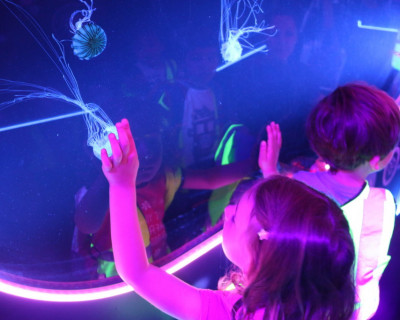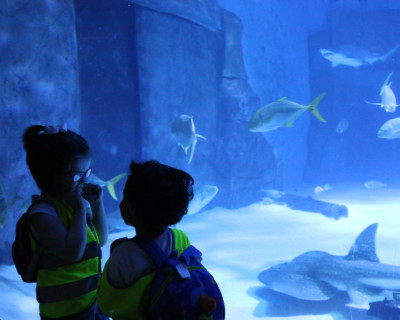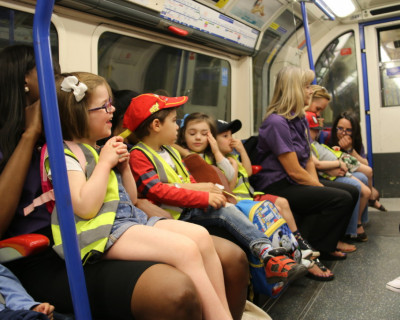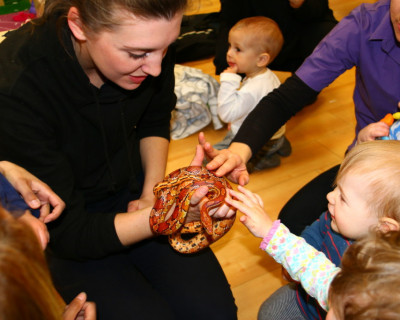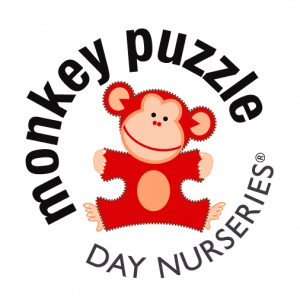We believe that in order to get the best outcomes for our children, we must all embrace our shared vision and have a strong ethos in our approach to learning and development. Our team vision at Monkey Puzzle Highbury is:
“Inspiring Children to Change Tomorrow’s World”
Our aim is to provide enchanting and enabling environments for children to learn in their own way. We have six themes of our Ethos which underpin everything that we do with the children at our nurseries and define our team culture, nursery design concept and education strategies.
Learning Themes
Inspiring young children to lead an active lifestyle starts in their childhood and is a core element of our learning ethos. Most young children are generally very active as they explore the surrounding world, gradually refining motor skills throughout their early development.
During the progression through education, a child’s level of active participation in sport or other physical activities significantly decreases. This might be due to more pressure from other areas of academia, lack of facilities to pursue a particular interest or just too much “screen time”.

It is important to instil the significance of an active lifestyle in our children as part of their physiological growth, but also as a foundation for general health and well-being in the future.
We absolutely encourage children at our nursery to be highly active. Whether this be moving around in our outdoor play area, exploring the nursery’s surrounding grounds for mini beasts or walking to the local park for group activities and outdoor games. Our team are passionate about facilitating a range of activities to accommodate even the wriggliest of children, encouraging the healthy building blocks of an active lifestyle, which may stay with them into adulthood.
We are passionate about inspiring creativity in learning. With a plethora of activities designed to spark creative minds, our specialist equipment accommodates everything from Music, Dance, Art & Crafts, Drama and more!
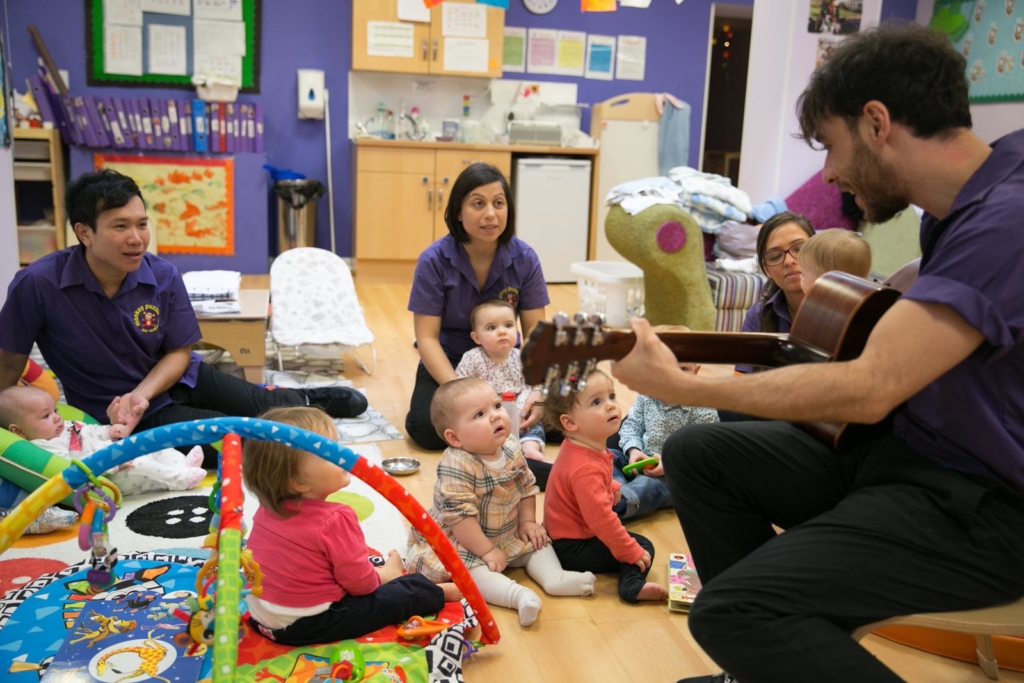 Music has an incredible ability to move us, provoking emotions and changing the way we think and feel. It also improves brain functions, closely linked with many areas of a child’s early development. Not only does music enhance a child’s aural abilities and language skills, but research also suggests a strong correlation between active participation in music and general learning ability and academic attainment. Music is a great way to engage children in learning, encouraging creativity and artistic expression, helping them connect with their imagination and channel emotions.
Music has an incredible ability to move us, provoking emotions and changing the way we think and feel. It also improves brain functions, closely linked with many areas of a child’s early development. Not only does music enhance a child’s aural abilities and language skills, but research also suggests a strong correlation between active participation in music and general learning ability and academic attainment. Music is a great way to engage children in learning, encouraging creativity and artistic expression, helping them connect with their imagination and channel emotions.
Our specialist knowledge and equipment allow us to offer a range of creative and music based activities for your child. With early introductions to a whole collection of world instruments, singing activities and piano playing; we encourage your child to be confident and self-assured, naturally applying creativity across all areas of learning.
To help you continue this learning at home, we’ve also setup a spotify account with playlists of our favourite nursery songs and rhymes! Our selection is a cheery combination of the English classics, as well as nursery songs from other countries, to meld with our language syllabus.
You can view our Spotify List through the link below:
https://open.spotify.com/user/monkeypuzzlehighbury
Participation in music not only enhances a young child’s development, but also ties in with an extensive range of skills and competencies relevant to future academic progress.
Listening
Listening is the first mode of language that children acquire, it is important for their understanding of the world and ability to communicate effectively with others. The ability for our brain to differentiate tone and pitch in a sound is what makes us able to understand language. Exposure to music from an early age gives the auditory system a head start, allowing speech and language skills to develop much more effectively.
Speech and Language
The human brain processes music and language in a similar way, both involving auditory processing of individual sounds. It is in understanding variations in pitch and verbal attenuation that we are able to decipher different words, using our memory to identify their meaning. Exploring music also improves phonological and phonemic awareness in speech. Just as music comprises of many different sounding notes, speech is also built up of connected phonemes, which when put together make up the words and sentences of spoken language.
Reading
Reading skills and verbal memory can be significantly improved through music tuition. It is verbal memory that retains information in your memory allowing comprehension of sentences and text when reading. Learning to play a musical instrument enhances the section of the brain responsible for verbal memory thus increasing reading ability.
Maths
Learning music notation also requires an understanding of time division and note value, two very important elements to reading and performing music. This level of understanding can be transferred to the application of basic maths.
Concentration
Music develops concentration skills, encouraging discipline and the ability to maintain attention to a refined task over prolonged periods of time. This is highly important for further development of any skill or task.
Coordination
Playing music improves hand-eye coordination and dexterity and enhances motor skills. These are all very useful when partaking in physical activities of any kind.
Confidence
Participation in music and particularly performance can play a significant role in boosting self-confidence and social esteem, encouraging imaginative expression of creativity whilst reinforcing the importance of inclusion and cooperation. Children can also build a sense of pride following achievement, gaining enthusiasm for learning.
Relaxation and Patience
Music can be used to relax the brain. It also teaches the importance of patience and perseverance to a particular task or learning objective, a skill which is increasingly important in later education.
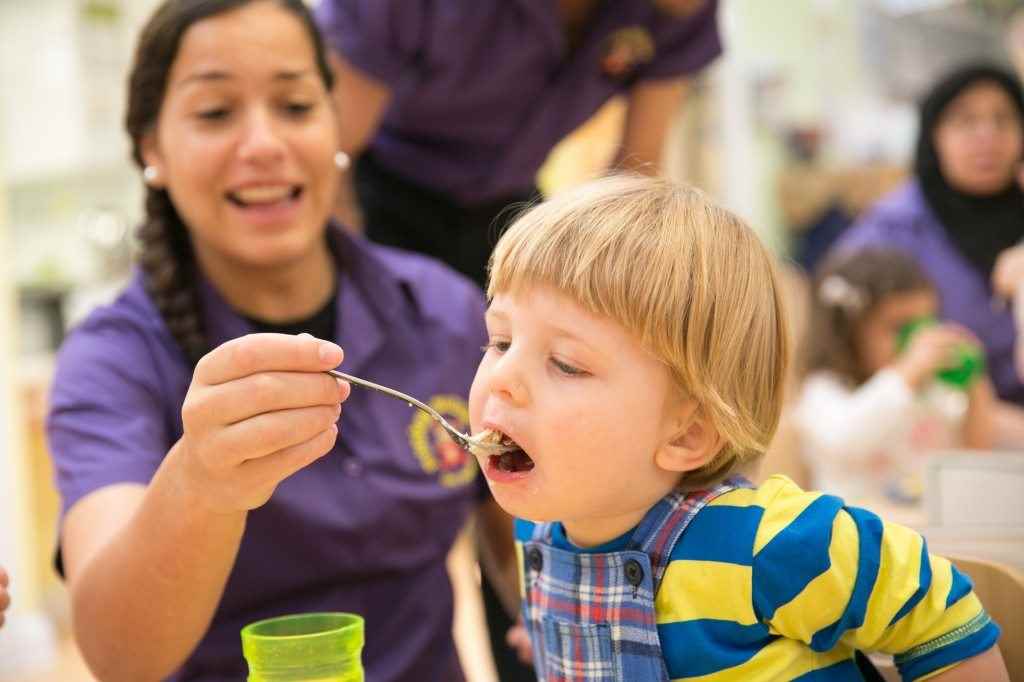 We believe it is absolutely essential for the children in our care to develop positive eating habits early on in their lives. Many of a child’s early experiences of food will have a significant impact on their preferences and eating habits later on in adult life, so it is important that we encourage children to be adventurous with their food, and to understand about different foods and their nutritional values. We provide a healthy and balanced diet for the children to ensure they have all the energy to fulfil their learning and thrive in the nursery environment. Our 4 week menus celebrate the diversity in our nursery, with dishes from all around the world and flavours, which will expand the children’s palette for great food.
We believe it is absolutely essential for the children in our care to develop positive eating habits early on in their lives. Many of a child’s early experiences of food will have a significant impact on their preferences and eating habits later on in adult life, so it is important that we encourage children to be adventurous with their food, and to understand about different foods and their nutritional values. We provide a healthy and balanced diet for the children to ensure they have all the energy to fulfil their learning and thrive in the nursery environment. Our 4 week menus celebrate the diversity in our nursery, with dishes from all around the world and flavours, which will expand the children’s palette for great food.
Children’s Cooking Counter
Our Children’s Cooking Counter offers an open plan kitchen facility, where children can observe the nursery chef making all their lovely food. It offers a great learning opportunity for children to learn about different ingredients, food groups and recipes and to work collaboratively with our chef to create some wonderful culinary delights!
More and More in the modern world we are innovating the way we live, work and play. The evolution of technology is something which perhaps defines the era in which we live, with the boundaries of possibility constantly challenged by creative minds looking to progress our knowledge and understanding of the world. Technology adds great benefit to many areas of life and education is no exception.
At our nursery we recognise the importance of supporting children’s exploration of technology as a learning tool and as a common aspect of the modern world. We have equipped our nursery with a multitude of technology to support your child’s learning and see it as our responsibility to ensure that children are taught from an early age about how to be safe with technology and the internet.
STEAM Learning
STEAM learning stands for Science, Technology, Engineering, Art and Maths. It is a specific pedagogical approach which promotes these areas of learning for young children and it has a key focus on explorative play. With the ever change world that we live in it will be super important for our children to develop knowledge and understanding in these core areas so that they can grow to be capable and competent in engaging with the world around them. You can learn more about our STEAM learning lab at Monkey Puzzle Highbury on our Environment page.
SMART Interactive Whiteboard and iPads
Our Pre-School and Toddler groups have access to our interactive Whiteboard, which is an educational tool for the facilitation of media in learning. We have turned the negative stigma of “screen time” into a positive way of engaging children in learning. The Interactive Whiteboard’s touch screen feature allows children to interact with an information rich digital platform, whilst also practicing writing and group cooperation skills.
In keeping both with Ofsted recommendation and our “green” ethos we use iPad technology to document observations and learning journeys, making the processes involved with excellent childcare as paper free as possible. Not only does this contribute towards caring for the planet, but it also gives our childcare professionals more valuable time to engage with your child instead of being bombarded with paper work. This also presents us with the opportunity to share your child’s successes through email, allowing you to stay up to date with their progress and send us your feedback at your own convenience.
Security
Technology also extends to security. We understand the importance of providing a safe and secure environment for your child at all times. CCTV and video door access control helps us to know who is entering the building to ensure that no unwanted visitors gain access at any time.
We have a strong focus on being environmentally friendly, providing your child with a solid understanding of the world, encouraging them to have respect for our planet. The effect of humans on Earth has and will continue to have an unprecedented effect on its sustainability and the future of all our lives.
Our nursery features a number of eco-friendly design concepts and operational strategies. We have efficient power and ventilation systems to ensure we reduce our carbon footprint in our daily operations. We also source all our furniture and resource from sustainable manufacturers to ensure longevity and we even recycle all of our used nappies to ensure that all the waste from our day of caring for your child gets put to good use.
Planting Seeds for the Future
Inclusive to teaching children about the world around us, we undertake projects on growing plants, fruits and vegetables. This not only helps children to understand the origins of food, to encourage healthy diets; but it also allows them to understand how the living world thrives and conditions required to support natural growth.
We believe that it is one of the most important things that we can teach children, to be respectful to others, treat everyone equally and celebrate the diversity in our local communities. Our nurseries have a highly diverse population, both in children and families, and in our staff team. We have many languages, cultures and religions who build the Monkey Puzzle Highbury & Islington community, and we like to celebrate this as much as possible.
We are proud to have a very diverse team. We actively recruit outstanding candidates from all over the world to come and join our team. This results in a team with a variety of cultures, languages and life experiences. Our team members teach their different languages and cultures through story-telling, activities, songs and role play which is embedded into the children’s routine starting from Baby Room.
Books
Each room has age appropriate books to support children’s learning and understanding about the world. We have books in different languages, books that tell stories about families from all around the world, families with a variety of religious and cultural backgrounds, books about children with disabilities and books that focus on how each family can have a diverse structure. In each room we’ve also created daily routine booklets in different languages, this supports our children during the settling in process and with learning their new routine in different languages too.
Toys and Resources
Learning through play is one of the most important ways to learn and develop for young children. That is why we offer our children toys that promote diversity, such as, dolls from a range of ethnic groups and toys that support different occupations whilst challenging the gender stereotypes, like a doctors set, a cooking set, a builders set, office equipment, etc. We also focus on gender neutral play by offering more gender-neutral toys, which are open ended and encourage children to explore their creativity. We encourage gender neutral play by ensuring children have the freedom to play with any resources they choose and actively promoting this through role modelling to ensure mutual respect.
Music
We have a very diverse team coming from different countries all around the world. Singing songs in different languages is encouraged during circle time or to celebrate a wide variety of celebrations in our nursery.
Events, Festivals and Celebrations
We celebrate a variety of different events and celebrations (religious, cultural and social) throughout the year. Our team follows an ‘Event Calendar’ which is discussed in detail at the beginning of every month. Our team creates themed weeks or engaging activities according to the events happening that month. Parents are encouraged to participate as well by offering to host or join activities of choice.
Our team prepare activities for the children that focus on mutual respect for each other and themselves, being kind and supportive, learning how to take turns and share. We are also talk about differences and similarities teaching children to value and respect diversity in the world around them.
How we Promote Equality and Diversity within our Team
We promote equal opportunities for all candidates to join our team, regardless of their ethnicity, religion, gender, nationality and more. Our team are from all over the world, which helps us mirror the diversity in the community around our children.
We also promote equal opportunities for all team members to progress within our nurseries, ensuring equal opportunities and diversity are promoted and reflected throughout our organisation structure.
Cultural Capital
It is the essential knowledge that children need to prepare them for future success. Cultural Capital is about giving children the best possible start to their early education. Children start in the nursery with a variety of different experiences and we want to ensure the curriculum we deliver enhances multiple opportunities for the children to experience this essential knowledge
How do we promote this in the nursery?
When your child starts in our nursery, we will ask you what you would like your child to experience. During the time your child will be at nursery, we will organize a wide variety of engaging activities and experiences to let them explore and discover ‘the awe and wonder of the world’. We promote Cultural Capital through real life experiences, such as, visiting our local care home, through role play activities such as going camping, by building a den using a table and blankets, getting torches and reading stories in the cosy den. This gives our children a taste of all the things you can do in our big wide world. We display the Cultural Capital activities and experiences the children have had in each room to encourage and promote discussion around their experiences.
Some examples of what we do:
- Visit from ZooLab which is an organisation that introduces many different animals like a snake, spider, snail, salamander, etc. to the children. They bring them with them so the children have the option to see and touch them.
- Visit from guide dog
- Visiting the National History Museum
- Visit from fire men with fire truck. The children get the opportunity to see a fire truck from close and even try out the water hose.
- Go for a picnic in the park.
- Pretending to be at the beach by creating the seaside inside the nursery.
- Making a tent and pretend to go camping.
- Visiting the care home
- Visiting the farm
- And more..
